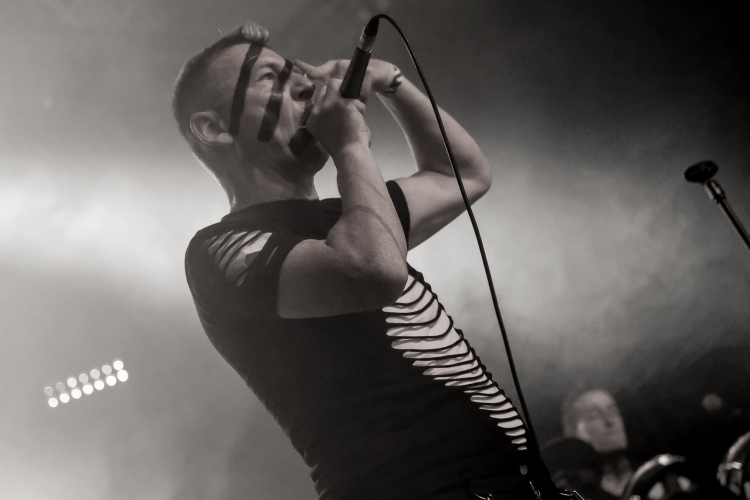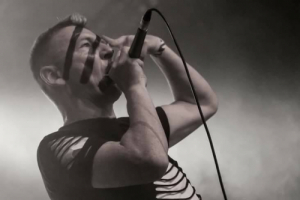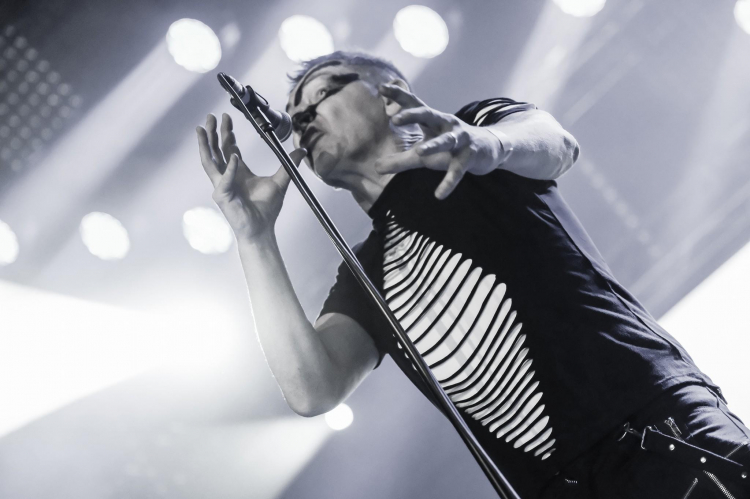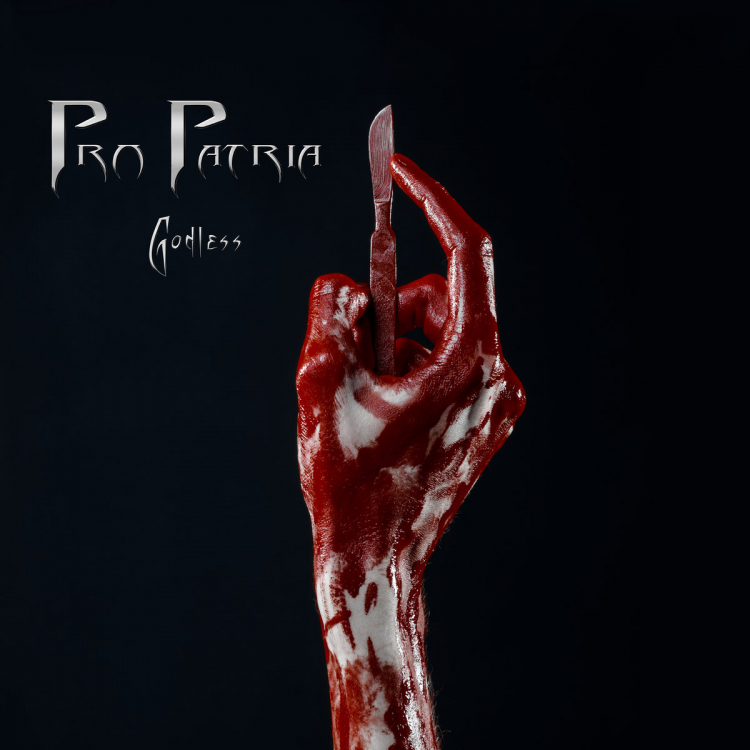Welcome to the site Pro Patria! Let’s start off with a warm-up question: What are three of your favorite albums of all time and why?
Peter V.: That’s a very difficult question to
answer because many albums have had a profound impact on me, but if I really
have to choose here you go:
"Welcome to the Pleasuredome" by
Frankie Goes To Hollywood. This is my number one all time favourite and I’m
sure that many people will frown when I say this. The problem with Frankie is
that most people consider them to have been a commercial product rather than
the creators of brilliant music. They were effectively more of a marketing hype
back then, with all of these scandals that were created on purpose in order to
make them popular, the “Frankie say” T-shirts, videos that they knew right from
the start were going to be banned by the puritan BBC etc. This is really
unfortunate because it has drawn the attention away from their music which, to
my opinion, is the most complex and ground-breaking ever created, also thanks
to Trevor Horn who is perhaps the greatest producer of all time. Try to count
the number of different layers and sounds in 'Relax' or 'Two Tribes' and you’d
be amazed. They were also the first band to do away with the classic
verse-chorus-verse-chorus-solo-chorus song structure which is present in just
about every song as from the fifties. There are some exceptions such as 'Stairway to Heaven' or 'Bohemian Rhapsody' but these were more artistic
deviations from the mainstream. 'Relax', on the other hand, in spite of its
unusual structure, keeps you jumping from the first note till the last. I could
write a book about Frankie, but it’s probably best that I leave it at this.
"Black Celebration" by Depeche Mode.
They were the great trendsetters of the eighties, stubbornly rowing against the
current and unabatedly doing their own thing in spite of devastating criticism
and getting booed at e.g. during the ‘85 Werchter Rock Festival. They created
seven amazing albums in only nine years’ time and if I have to pick a favourite
it’ll be "Black Celebration". It certainly wasn’t their most popular album,
perhaps because it was effectively their darkest work, but I’ve always
experienced it as their most personal, most gripping music. It was one of the
beacons I could relate to whenever I, as a kid, got overwrought with emotions
and was in dire need of support. This album’s never failed me.
"Spiral" by Vangelis. I could have
mentioned "Gashed Senses And Crossfire" by the Frontline Assembly, "Bites" by
Skinny Puppy, "No Comment" by Front 242 or "That Total Age" by Nitzer Ebb, but for
this interview I prefer to mention something completely out of the ordinary,
and yet, not quite so much. Vangelis was already doing electronic music a
decade before Kraftwerk and he was also light years ahead of them, as testifies
this extraordinary album that, even after forty-five years, still sounds
breathtaking. He was one of the founding fathers of electro, along with Delia Derbyshire, Josef Tal and
others and it’s simply astounding what the man produced using home-built
synths. In these early days he even managed to perfectly recreate the sound of
a tolling bell, which is one of the most complex and difficult sounds to
produce electronically. Apart from that and like most of his music, this album
carries the listener far away on a mind-boggling mental trip.
Grab your copy of "Godless" above!
In 2017 you were invited to the Familientreffen EBM Festival. Even though Pro Patria has not been active for such a long time, you decided to go anyway. Why was that?
Peter V.: Receiving that invitation was indeed a surprise to me, because for as far as I was concerned Pro Patria had died in 1999 and I hadn’t done anything with music ever since. This period of inactivity was not only because I’d become increasingly disappointed that my hard work during the nineties hadn’t borne any fruits, but also due to circumstances which forced me to abandon music. I was surrounded by people who didn’t believe in me and who wanted me to become a “responsible adult” (whatever that means) and suddenly making music was no longer part of my life. By the time I got the invitation, however, my personal situation had again changed dramatically, much to the better this time, and I’m now surrounded by people who really believe in me and who want me to continue with Pro Patria. Every artist will tell you that support from their environment is vital and I’m certainly no exception. I have to thank my wife in the first place because it was she who convinced me that I had nothing to lose, so I went for it.
After the festival, you decided to reboot Pro Patria. What led you to want to continue creating music under Pro Patria even though the project wasn’t active for a long time?
Peter V.: I had always been Pro Patria and the
name had achieved some modest popularity in the nineties, so it was only
logical that I’d pick up where I had left. It made things easier to return to
the scene and I’m sure that many people were happy to see Pro Patria on stage
again after all these years, if I can judge by the pats on my shoulder from the
audience and from the other bands. Doing that Familientreffen gig was a sort of
liberation to me. Suddenly a button was switched on in my head that had been
shut off for so long and immediately the ideas started to pour out again, as if
they’d been locked up all of this time and were pushing the door to get out all
at once. How could I have refused to let them out?
When you recorded “Back To Basics”, were you attempting to recreate old school Pro Patria sounds? Or did you want to do something new with the music?
Peter V.: I’ve always been a non-conformist
and even though I’ve obviously been influenced by the great, I’ve always tried
to do my own thing and to create my own specific style. The idea was to start
exactly where I had left off and so the first songs I created, 'Pray for
Salvation' and 'Living in a Cage', were derived from demos I had been working
on in 1997, during the “Quod Erat Demonstrandum” production because at the time
I was already thinking about a successor. I hoped that using these old,
unfinished songs would create a seamless transition with the new album.
Unfortunately, it didn’t, and there were two reasons for that. First of all, I
consider myself to be a musician, certainly not a producer and I wanted to
learn the dark arts of mixing and mastering myself in order not to always
depend on others. This was a serious miscalculation from my part because I had
never anticipated that mixing and mastering were so difficult. I got it
completely wrong and the album sounded… terribly, much harsher than I had
imagined. In the meantime I’ve remastered “Back to Basics” which should now
sound more in line with my other work and everyone who’s bought the original CD
can get the remastered version for free, just send me a message.
Another reason why “Back to Basics”
became somewhat different from my old work is that exactly twenty years had
passed between them and now I believe that no-one could have picked up exactly
where they had left off after such a long time, especially since that period
had been extremely painful. I was no more the same person, torn by grief and
nightmares about the past, but also looking at the future with joy and
confidence, and this clearly reflected in the music. On the positive side, this
long, hard period proved to be an excellent source of inspiration and the songs
and lyrics for the album jumped out of my mind in only six week’s time.
2019 saw the release of “Executioner”. I read that this album was meant to bridge the gap between old-school Pro Patria sounds and the modern school of EBM and electro. How did you achieve that?
Peter V.: “Back to Basics” I realised that my new work was perhaps a bit too much off the mark and I needed to reassure my audience that it was still me and that Pro Patria would always be the same. Hence “Executioner” the style of which, to my opinion, fits nicely in between “Quod Erat Demonstrandum” and “Back to Basics”. 'I Watched You Die' is also one of the songs which originated in 1997 and which I used to ensure continuity. “Oppression” is a remake of the very first song of the very first demo we recorded in November 1988. On this album I’ve tried to amalgamate many different styles and ideas whilst elaborating them with the established Pro Patria sound. On this album I’ve also tried to push the EBM barrier a bit further and even to do some experiments, just to see how far I could go.

2021 sees the release of “Godless”. What is the album about?
Peter V.: The title “Godless” has two meanings, actually. First of all, I’ve always been critical about religion because you should be allowed to decide for yourself what you believe in rather than other people conditioning you as from birth with what they want you to believe. It’s a theme that has always been prominent in my lyrics. Be critical about everything that people have told you and decide for yourself. You have a free mind.
More important, however, is the state of our planet, which, as most of us know, isn’t very good. When we will eventually destroy our beautiful home, the only one that we have, no god will come down to save us. That’ll be our doing, or rather undoing. This may sound pessimistic but a couple of solar panels and re-usable shopping bags just aren’t going to cut it. We are already consuming the resources and capabilities of one and a half planet, so what will it be like in thirty years’ time when there will be nine billion people? Nine billion who’ll all want food, a house, a car, the latest mobile phone and… space to live in. Space that can only come from nature since we’ve already taken everything else. “Godless” is about those who don’t care about the future of our children and are only interested in short-term gain, greedily stealing the resources that are meant for future generations. But it’s not just about politicians or captains of industry or company shareholders. The tragedy is that a large part, perhaps even the major part of our fellow humans, don’t care and are more interested in who’s slept with whom in the latest reality show on TV than in the future of our planet.
Perhaps I’m too pessimistic. Time will tell. In the meantime, I feel compelled to shout a bit louder in order to make people listen.
The cover art is grisly. It shows a bloodied hand playing with a scalpel. How does this image reflect the themes of the album?
Peter V.: The message of the album is hard, as explained above, plus the music is razor-sharp, so I needed artwork that reflects this. We’re done with all the soft talk as nothing seems to be changing. We have no more time to lose, so it’s time that we finally start dealing with this global problem. I hope that a shocking image may contribute to us waking up.
What is your favorite track on “Godless” and why?
Peter V.: Ah, that’s an easy question to answer! 'Angel', without a shred of a doubt, and for a variety of reasons. First of all because I think it’s the most interesting song on the CD from a purely musical perspective, combining acoustic and electronic, also combining several musical ideas. Secondly because it’s again an extremely personal song, describing how I emerged from a time when I truly believed that my life was utterly spent. Most importantly of all, because this song is dedicated to the angel who pulled me out of a desperate situation and who would later become my wife.
What else does Pro Patria have in store for 2021? Any singles, EPs, remixes, or additional albums in the works? If so, can you tell us about it at all?
Peter V.: Since the dam was broken four years ago, the music keeps coming to me like an avalanche. I often wake up in the middle of the night with new ideas in my head, begging me to be transformed into songs. So I can tell you that work has initiated on my fifth full album, which should be out sometime next year. I still can’t tell you what it’ll be about; it’s usually during the writing process of an album that I get a clear idea about where I’d like to take it to, but the music for the first track is already finished. Now I have to come up with some good lyrics. Let’s see where it’ll lead me.
One thing I can already tell for certain is that, in agreement with my record label and contrary to my previous two releases, I will not publish the album one song at a time but the album will be presented as a whole when it’ll be completed. Though I might release a video here or there as an appetizer.
Lastly, I would like to thank you for your time. I leave the space below free for you to mention anything I may have missed. Cheers!
Peter V.: It was a real pleasure doing this interview and I hope that your readers find it interesting to read. Thank you for your kind support.
This interview was commissioned through our Ko-fi page.








